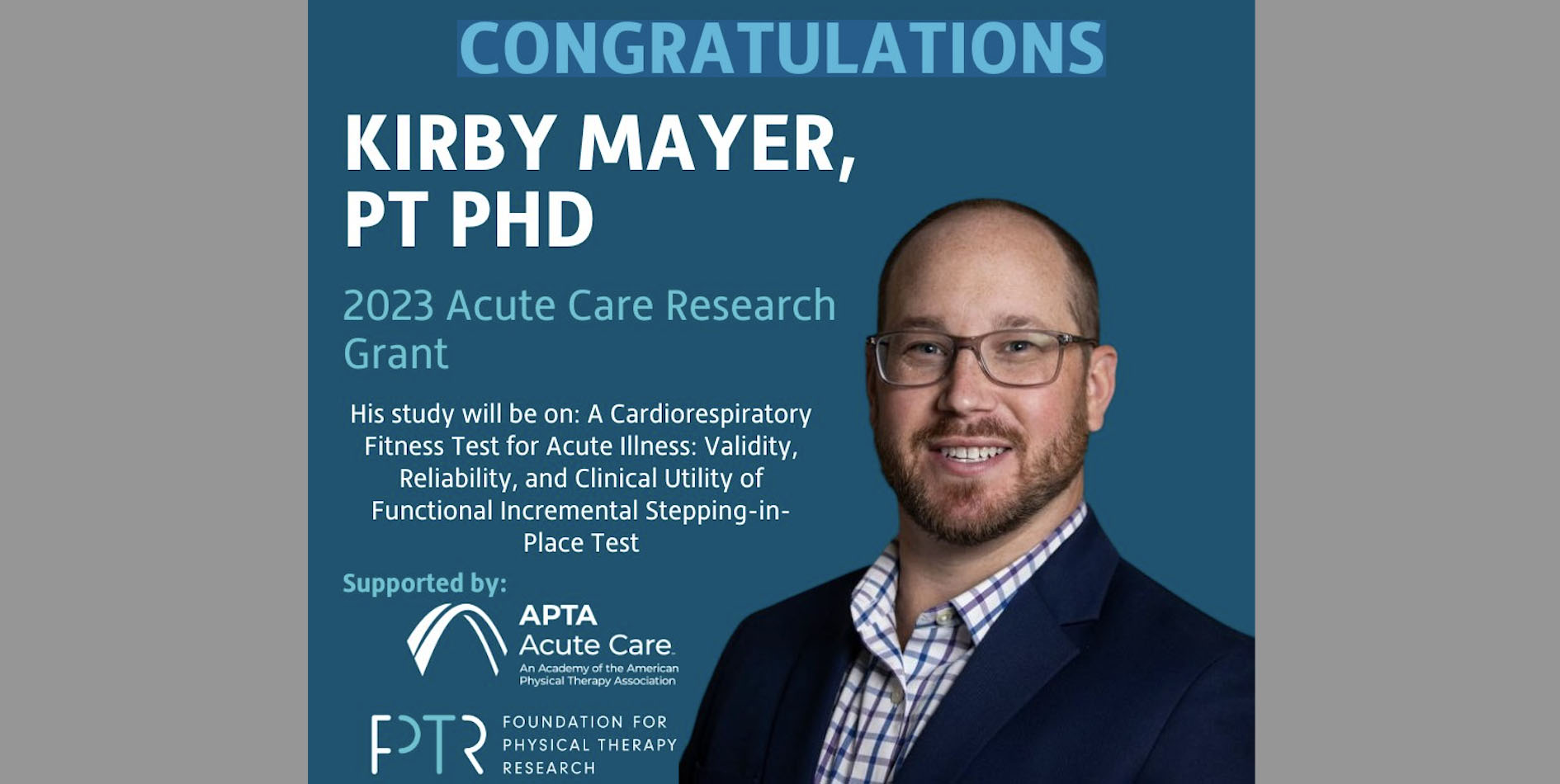CHS Professor, Alum Receives $80K Acute Care Research Grant

By Ryan Clark
CHS Communications Director
Kirby Mayer, DPT, PhD and Assistant Professor in Physical Therapy and the Rehabilitation Sciences PhD Program, is the recipient of an $80,000 Acute Care Research Grant from the Foundation of Physical Therapy Research.
Mayer, one of 10 Foundation recipients, proposed a project entitled, “A Cardiorespiratory Fitness Test for Acute Illness: Validity, Reliability, and Clinical Utility of Functional Incremental Stepping-in-Place Test.”
The research will assess the validity, reliability, and clinical utility of the Functional Incremental Stepping in Place Test (F-IST), as compared to the standard cardiopulmonary exercise testing in the bedside environment.
The Foundation for Physical Therapy Research awarded a total of $810,000 in funding: $560,000 to fund 10 physical therapy research grants and $250,000 for the 10th year of The Center on Health Services Training and Research (CoHSTAR).
“Research funding is competitive. All of this year’s grant recipients should be commended for developing compelling projects that underwent a rigorous peer review by our Scientific Review Committee,” says Paul A. Rockar, Jr, PT, DPT, MS, FAPTA and President of the Foundation. “And thanks to the continued support of our donors, sponsors, and partners at APTA, we are thrilled to support these promising researchers in their early career work so that they can continue to grow.”
“Our team and collaborators at Duke and Florida Atlantic University are excited to receive this grant from the Foundation for Physical Therapy Research (FPTR) with financial support from the Academy of Acute Physical Therapy,” Mayer said. “The FPTR has and continues to advocate and support for research that improves physical therapy practices and pioneers discovery.”
Mayer said the grant will support a multi-site observational study to test the reliability, validity, and utility of a cardiopulmonary exercise test (CPET, also sometimes called a "stress" test). The new test, called the Functional Incremental Stepping in Place Test, is unique and novel as it was developed to be used in the hospital, but still maintains the principles of maximal CPET testing that are typically performed in sophisticated cardiac or medical laboratories.
The hospital environment has classically prevented sub- and maximal-CPET due to limited space, equipment, and time, he said.
“Before we can use the test in clinical practice, it is important that we examine and confirm the test is accurate, responsive, and valid,” Mayer said. “We will compare results from our test to the current gold-standard of CPET testing in patients and healthy adults. We hope to demonstrate that test provides great value when performed by rehabilitation clinicians in patients who are admitted to hospital. Ultimately, improved assessment of the cardiopulmonary performance provides an enhanced ability to detect impairments and provided personalized rehabilitation treatments for our patients.”
Scott Lephart, PhD and Dean of the College of Health Sciences, said the latest grant is another example of the fine work Mayer — and all of the researchers in the College — have been accomplishing.
“Kudos go out to Dr. Mayer as he continues to set a high bar when it comes to meaningful, difference-making research,” Lephart said. “He is a fine example of the kind of professor and researcher we want in our College, as he continues to help us make a difference in our Commonwealth and our region.”
Mayer said this grant is even more special.
“Personally, the first grant I received as a trainee was the PODS II from the FPTR, thus, they literally built the foundation — pun intended — for my career as a clinician-scientists,” he said. “Receiving this new grant as a primary investigator marks a major milestone in my career. I am grateful for FPTR, the academy of Acute Care Physical Therapy, our research teams, and all the patients that are invested in clinical research with the goal of improving the assessment and treatment of patients in the hospital with acute illnesses.”